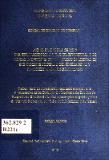| dc.contributor.advisor | Cordero Cordero, Teresita | |
| dc.contributor.author | Rarick, Sarah | |
| dc.date.accessioned | 2020-08-04T17:14:17Z | |
| dc.date.available | 2020-08-04T17:14:17Z | |
| dc.date.issued | 2012 | |
| dc.identifier.other | 000263259 | |
| dc.identifier.uri | http://hdl.handle.net/11056/17790 | |
| dc.description | Maestría en Violencia Intrafamiliar y de Género | es_ES |
| dc.description.abstract | La investigación presenta un acercamiento al tema de la violencia estructural de género que viven las mujeres privadas y ex privadas de libertad en procesos de egreso del medio cerrado del sistema penitenciario costarricense y transición hacia sus comunidades. Utilizando un enfoque de derechos humanos y de género, la comprensión de este fenómeno se formuló a partir de la recuperación de las experiencias de tres mujeres en tales procesos, con el fin de impulsar a la sociedad a desarrollar y ejecutar acciones efectivas y urgentes que garanticen la protección de sus derechos humanos y provean el apoyo necesario para poder salir del sistema penal definitivamente.
La selección de las participantes en las participantes etapas del egreso - en el semi-institucional y en libertad condicional – se realizó con el propósito de explorar las condiciones que producen sus vulnerabilidades; ante todo, aquellas que se deben a la violencia estructural y de género. Se enfocó en el ejercicio de la violencia al impedir una reducción de la condena, reducir las opciones viables de cumplir con los requisitos jurídico e institucionales (en el semi institucional o en libertad condicional) y socavar los esfuerzos de las mujeres ex privadas de libertad de abstenerse de hechos delictivos en su comunidad. Este estudio revelo como la violencia estructural y de género se manifiesta en un alto riesgo de que las mujeres privadas de libertad, 1) se quedarán atrapadas en el sistema penal por no lograr reducir su condena, 2) estarán devueltas al medio cerrado por no lograr cumplir con las condiciones de su libertad condicional, o 3) reincidirán en el tráfico de drogas, una decisión cuyo riesgo no es solo el ser detenida nuevamente, sino que también implica poner su salud y/o su vida en peligro.
Esta investigación cualitativa parte de un enfoque exploratorio y el trabajo empírico se llevó a cabo con la metodología de estudios de casos, donde se incluyeron técnicas de entrevistas semi estructuradas y observaciones participativas. A partir del estudio, se logró identificar áreas de vulnerabilidad asociadas con este proceso y señalar aspectos importantes del problema que impiden la garantía de protección de los derechos humanos de las mujeres privadas y ex privadas de libertad. | es_ES |
| dc.description.abstract | The research presents an approach to the issue of structural gender-based violence experienced by women prisoners and former prisoners in the process of leaving the closed environment of the Costa Rican prison system and making the transition to their communities. Using a human rights and gender approach, the understanding of this phenomenon was formulated based on the recovery of the experiences of three women in such processes, in order to encourage society to develop and implement effective and urgent actions that guarantee the protection of their human rights and provide the necessary support to be able to leave the prison system definitively.
The selection of participants in the exit stages - in the semi-institutional and probation stages - was done with the purpose of exploring the conditions that produce their vulnerabilities; above all, those due to structural and gender-based violence. It focused on the exercise of violence by preventing a reduction in sentences, reducing viable options for complying with legal and institutional requirements (in the semi-institutional or probationary setting) and undermining the efforts of former women prisoners to abstain from criminal acts in their community. This study revealed how structural and gender-based violence manifests itself in a high risk that women deprived of their liberty, 1) will be trapped in the criminal system for failing to reduce their sentence, 2) will be returned to the closed environment for failing to comply with the conditions of their probation, or 3) will reoffend in drug trafficking, a decision whose risk is not only to be detained again, but also to put their health and/or life in danger.
This qualitative research is based on an exploratory approach and the empirical work was carried out using the case study methodology, which included semi-structured interview techniques and participatory observations. From the study, it was possible to identify areas of vulnerability associated with this process and to point out important aspects of the problem that impede the guarantee of human rights protection for women prisoners and former prisoners. | es_ES |
| dc.description.sponsorship | Universidad Nacional, Costa Rica | es_ES |
| dc.description.sponsorship | Universidad de Costa Rica. | es_ES |
| dc.language.iso | spa | es_ES |
| dc.publisher | Universidad Nacional, Costa Rica | es_ES |
| dc.rights | Acceso abierto | es_ES |
| dc.rights | Attribution-NonCommercial-NoDerivatives 4.0 Internacional | * |
| dc.rights.uri | http://creativecommons.org/licenses/by-nc-nd/4.0/ | * |
| dc.subject | OPRESIÓN | es_ES |
| dc.subject | COSTA RICA | es_ES |
| dc.subject | VIOLENCIA INTRAFAMILIAR | es_ES |
| dc.subject | PRISIONES | es_ES |
| dc.subject | MUJERES | es_ES |
| dc.subject | OPPRESSION | es_ES |
| dc.subject | INTRAFAMILY VIOLENCE | es_ES |
| dc.subject | PRISONS | es_ES |
| dc.subject | WOMEN | es_ES |
| dc.title | ¿Cómo salen de la cárcel? Una exploración de la violencia estructural y de género que viven algunas privadas de libertad en sus procesos de egreso del sistema penal y transición hacia sus comunidades | es_ES |
| dc.type | http://purl.org/coar/resource_type/c_bdcc | es_ES |
| una.tesis.numero | 362.8292 R221c | es_ES |
| dc.description.procedence | Instituto de Estudios de la Mujer. | es_ES |


